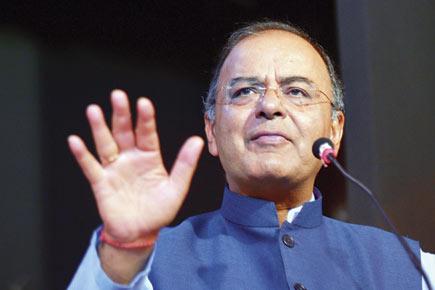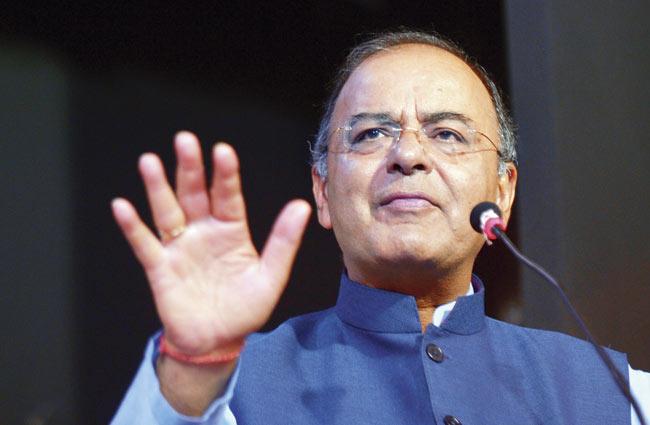Finance Minister Arun Jaitley Monday said that if the Reserve Bank of India moved to lower the cost of capital by cutting interest rates at this juncture of cooling inflation, it would provide a "good fillip" to the economy

Finance Minister Arun Jaitley Monday said that if the Reserve Bank of India moved to lower the cost of capital by cutting interest rates at this juncture of cooling inflation, it would provide a "good fillip" to the economy
New Delhi: Finance Minister Arun Jaitley Monday said that if the Reserve Bank of India moved to lower the cost of capital by cutting interest rates at this juncture of cooling inflation, it would provide a "good fillip" to the economy.
"I am quite clear in my mind that the cost of capital has to come down. Inflation has moderated, global fuel price has eased. Therefore, if the RBI, which is a highly professional organisation, in its wisdom decides to bring down the cost of capital it will give a good fillip to the Indian economy," he said.
ADVERTISEMENT

Arun Jaitley
Data released last week showed the country's factory output grew at 2.5 percent in September even as retail inflation fell to a record low of 5.52 percent during October.
Speaking at the Citibank Investor Summit here, Jaitley hoped that as a professional organisation the RBI will take "the best decision" on the count of cutting interest rates.
Jaitley also said that while the targets fixed for disinvestment in the current financial year are quite ambitious, he was, nevertheless, hopeful of realising them.
"We have very ambitious disinvestment target this year. I hope we will be able to reach close to that," Jaitley said.
The government has set a target of Rs.43,425 crore to be earned from selling stakes in public sector undertakings during the current fiscal.
Regarding two major items on the government's reform agenda, the finance minister said while he hoped the Insurance Amendment Bill will be passed in the upcoming winter session of parliament, the government would table the Goods and Services Tax (GST) bill.
He said he was in touch with the Parliament Select Committee, currently vetting the insurance bill, and would try to persuade it to give its report at the earliest.
Parliament, where the Congress and the Left parties continue to oppose certain clauses in the bill, is scheduled to convene Nov 24 for the month-long winter session.
The panel has been asked to give its report on the last day of the first week of the session.
In the 15-member committee headed by BJP member Chandan Mitra, seven members, including the Biju Janata Dal's Kalpataru Das and Independent Rajeev Chandrashekhar, support the bill.
The Congress has three members while the Samajwadi Party, the Bahujan Samaj Party, the CPI-M, the Trinamool Congress and the AIADMK have one member each. They are also opposed to certain clauses in the bill.
The amendment aims at increasing private equity from 26 to 49 percent in the insurance sector, and was referred to the Select Committee in August.
The government can convene a joint session of parliament to get the bill passed but only after it is voted on and defeated in the Rajya Sabha.
The BJP has a comfortable majority in the Lok Sabha but has only 42 members in the Rajya Sabha. The BJP-led National Democratic Alliance (NDA) has 57 members while the Congress has 69 in the Rajya Sabha.
The Congress had said the NDA introduced many amendments to what the previous United Progressive Alliance (UPA) government led by it had tabled in the house. Thus, it required a closer look.
The BJP had opposed the insurance bill when the UPA tabled it in the Rajya Sabha.
Jaitley also said he will apprise the Empowered Committee of State Finance Ministers of the draft Constitution Amendment Bill on GST before introducing it in parliament.
Last week, the committee met here and expressed the hope that the new tax regime could be implemented by the proposed date - April 1, 2016 - notwithstanding their differences with the central government over some key provisions.
The central government has written to the panel suggesting that the threshold annual turnover for levying the GST should be increased to Rs.25 lakh (Rs.2.5 million) from Rs.10 lakh (Rs.one million).
The committee in August resolved to lower the threshold limit for imposing the GST on companies from a turnover of Rs.25 lakh to Rs.10 lakh.
Seen as a key to facilitating industrial growth and improving the business climate in the country, the GST bill needs to be passed by a two-thirds majority in both houses of parliament and by the legislatures of half of the 29 states to become a law.
 Subscribe today by clicking the link and stay updated with the latest news!" Click here!
Subscribe today by clicking the link and stay updated with the latest news!" Click here!







